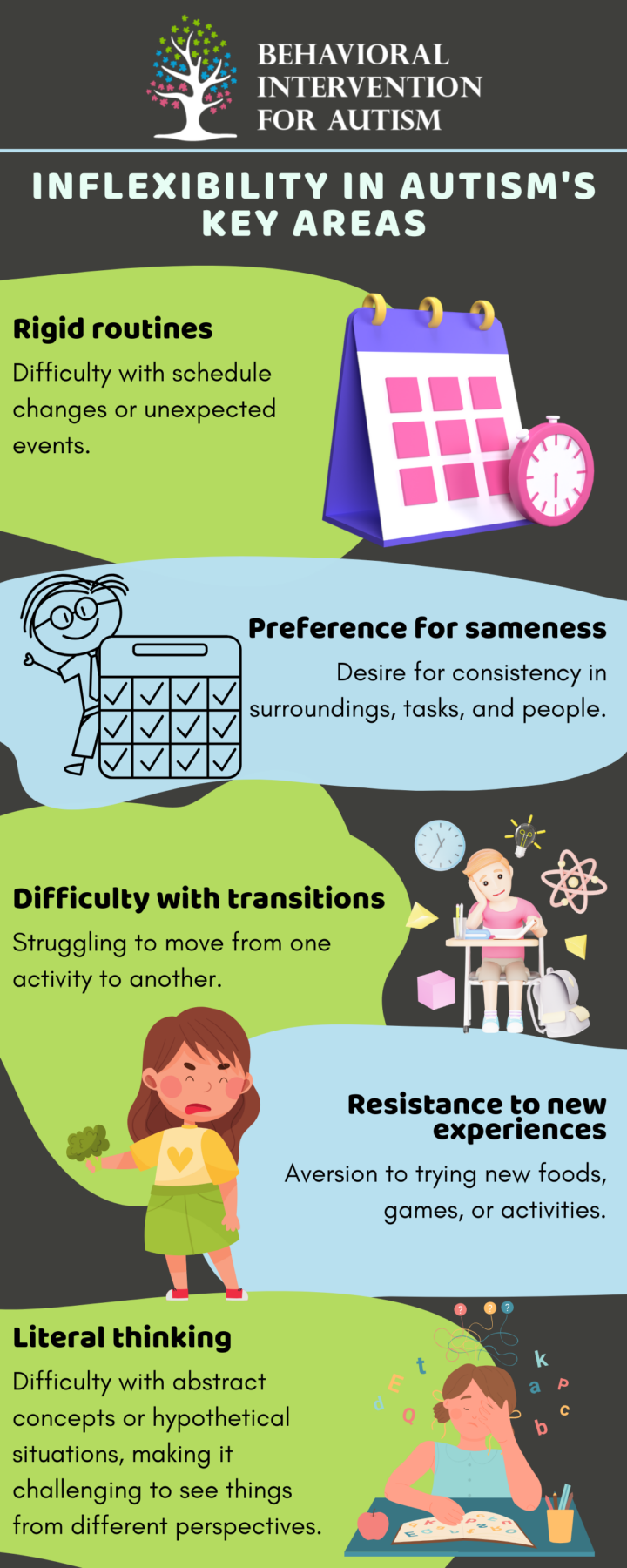
Table of Contents
Inflexibility in behavior, thought, and routines is a common trait among individuals with autism spectrum disorder (ASD). Often associated with a preference for predictability and routine, inflexibility can manifest in various ways, from strict adherence to schedules to resistance to change in one’s environment or expectations. For many on the autism spectrum, inflexibility provides comfort and helps manage anxiety, but it can also pose challenges in social, academic, and daily functioning.
What is Inflexibility in Autism?
Inflexibility refers to difficulty adapting to new situations, adjusting behaviors, or considering alternate perspectives. For individuals with autism, inflexibility is often a way to maintain a sense of control in a world that can feel chaotic and unpredictable. While neurotypical individuals also have routines and preferences, the level of inflexibility in autism is generally more pronounced and can significantly affect their functioning.
Inflexibility in autism can be observed in several areas:

Cognitive Inflexibility Study Insights
Exploring the study insights on cognitive inflexibility in individuals with autism provides valuable information on the interplay between cognitive rigidity and mental health outcomes. Understanding the statistical analysis results and the significance of individualized treatment approaches is essential for optimizing the well-being of individuals on the autism spectrum.
Statistical Analysis Results
A comprehensive statistical analysis unveiled crucial connections between cognitive inflexibility and mental health outcomes in individuals with autism. Specifically, cognitive inflexibility, identified as one of the traits measured at age 16, demonstrated a strong correlation with depression, anxiety, and behavioral problems at age 23. This correlation underscores the profound impact of cognitive inflexibility on the emotional and behavioral well-being of individuals on the autism spectrum.
Mental Health Outcomes | Correlation with Cognitive Inflexibility |
Depression | Strong association |
Anxiety | Strong association |
Behavioral Problems | Strong association |
The statistical analysis findings highlight the critical role of cognitive inflexibility in influencing the mental health trajectories of individuals with autism, emphasizing the need for targeted interventions that address cognitive rigidity.
Importance of Individualized Treatment
Recognizing the significance of individualized treatment strategies is paramount in addressing cognitive inflexibility in individuals with autism. Tailoring interventions to the specific needs and challenges of each individual can lead to more effective outcomes in managing cognitive rigidity and promoting mental well-being.
Studies have indicated that greater cognitive inflexibility in autistic adolescents is linked to elevated internalizing symptoms, such as anxiety and mood disorders, with a moderate effect size. Additionally, increased cognitive inflexibility is associated with amplified externalizing symptoms, including aggression and rule-breaking behaviors, with a large effect size. These findings underscore the critical impact of cognitive inflexibility on the vulnerability of individuals on the autism spectrum to mental health difficulties.
Mental Health Symptoms | Association with Cognitive Inflexibility |
Internalizing Symptoms (e.g., Anxiety, Depression) | Moderate effect size |
Externalizing Symptoms (e.g., Aggression, Rule-breaking Behaviors) | Large effect size |
Understanding the importance of individualized treatment that addresses cognitive inflexibility is key to fostering optimal mental health outcomes for individuals with autism. By utilizing tailored approaches that consider the specific needs and challenges associated with cognitive rigidity, caregivers and professionals can support individuals on the autism spectrum in navigating the complexities of their unique cognitive profiles.

How Inflexibility Impacts Daily Life
Inflexibility can affect a variety of life areas, from social interactions to academic achievement and daily living skills. Understanding these impacts helps caregivers and educators identify specific ways to offer support.
1. Social Relationships
Rigid thought patterns and difficulty adapting to social cues can make socializing a complex experience for individuals with autism. They may struggle to take turns in conversation, adjust to the flow of social interactions, or understand the unspoken rules that often shift depending on context.
2. Academic Environment
Inflexibility can pose challenges in a school setting where schedules, assignments, and rules are subject to frequent change. Students with autism may struggle with transitions, adaptions to group activities, or handling feedback, which can lead to frustration or disengagement.
3. Home Life and Daily Living Skills
At home, inflexibility can influence day-to-day activities such as mealtimes, hygiene routines, and sleep schedules. Routines provide comfort, but deviations can cause anxiety or meltdowns. This can make it difficult for families to manage daily activities in a way that accommodates both the individual’s preferences and the family’s needs.
4. Recreational and Community Activities
Engaging in community activities like sports, public events, or family gatherings often involves unpredictability. These environments may require spontaneous decisions, sharing, and flexibility in social interactions. For individuals with autism, this unpredictability can be daunting and, in some cases, lead to isolation or avoidance.

Strategies for Supporting Inflexibility in Autism
Support for inflexibility in autism involves helping individuals feel safe, providing gradual exposure to change, and using tools that enhance predictability. Here are some effective strategies:
1. Establish Predictable Routines
Creating and maintaining predictable routines helps reduce anxiety. Knowing what to expect throughout the day provides a sense of control, and routines can include visual schedules, daily planners, or digital reminders to enhance predictability.
- Visual Schedules: Visual schedules break down daily routines or tasks step-by-step. These can be images, symbols, or written lists, and they allow the individual to anticipate and mentally prepare for each activity.
- Timers and Cues: Setting a timer for transitions allows individuals to prepare for upcoming changes. Countdown cues (e.g., “10 minutes left”) can help them adjust gradually.
2. Introduce Gradual Changes
Change can be challenging, but introducing it slowly and consistently helps build flexibility. For instance, small modifications within a routine (such as changing the timing of a favorite activity by five minutes) can be a starting point. Gradual change helps reduce resistance and creates a foundation for more significant adjustments.
3. Use Social Stories and Role-Playing
Social stories are short narratives that describe a specific situation, what to expect, and how to respond. They can be beneficial in preparing individuals for new experiences or changes in routines.
Role-playing allows the individual to practice flexible thinking in a safe, controlled environment. For example, caregivers can set up mock scenarios to practice what to do if plans suddenly change or if someone else wants to make a decision.
4. Teach and Practice Coping Strategies
Individuals with autism benefit from learning coping skills to manage anxiety or frustration when faced with change. Strategies like deep breathing, mindfulness exercises, or having a “comfort item” can help them feel more grounded. Practicing these coping techniques consistently makes them more accessible during moments of stress.
5. Provide Clear, Simple Explanations for Changes
Explaining why a change is happening can reduce anxiety. For example, instead of “We’re going to the store now,” try “We’re going to the store to buy your favorite snacks. It might be busy, but I will be with you.” Clear explanations provide context and make unexpected changes feel less arbitrary.
6. Celebrate Small Wins and Progress
Building flexibility is a gradual process, and celebrating small steps helps encourage the individual. For instance, acknowledge when they try a new food, engage in an unfamiliar activity, or adapt to a new routine. Positive reinforcement builds confidence and increases the likelihood of repeating flexible behavior.
Using Therapy and Professional Support to Foster Flexibility
Therapies that focus on behavioral adaptation, social skills, and emotional regulation can provide targeted support in managing inflexibility.
1. Applied Behavior Analysis (ABA) Therapy
ABA therapy can be effective in teaching specific, measurable skills that increase flexibility. Through techniques such as positive reinforcement, ABA can help individuals develop tolerance for change, practice new behaviors, and improve problem-solving skills.
2. Occupational Therapy (OT)
Occupational therapists work on improving daily living skills and helping individuals manage sensory sensitivities, which often contribute to inflexibility. OT can include exercises to gradually introduce sensory experiences or develop routines that foster self-regulation.

3. Cognitive Behavioral Therapy (CBT)
CBT helps individuals identify thought patterns that cause distress and replace them with healthier alternatives. In the context of inflexibility, CBT can teach individuals strategies to manage anxiety associated with change, develop flexible thinking skills, and recognize when they are stuck in rigid thought patterns.
4. Social Skills Training
Social skills training helps individuals practice flexibility in social interactions, such as taking turns, sharing, and adapting to group activities. Role-playing and modeling appropriate social responses make it easier for individuals with autism to understand and respond to different social cues.
Explore Personalized Support Options
Inflexibility in autism can make it challenging for individuals to adapt to changes in routines or expectations, leading to heightened stress and frustration. With effective strategies, we can help build resilience and flexibility over time.
Behavioral Intervention For Autism offers specialized ABA therapy in Florida, designed to address these challenges through compassionate, individualized care. Our team focuses on creating supportive, engaging experiences that empower individuals to navigate daily transitions with greater ease. Reach out to us to learn more about our high-quality services and how we can support your journey.
- 9 Common Obsessions of Children With Autism You Should Know - February 25, 2025
- What is Neurodiversity? A Guide to Embracing Differences - February 25, 2025
- Understanding Hyperfocus in Autism: What It Means and Why It Happens - February 25, 2025
